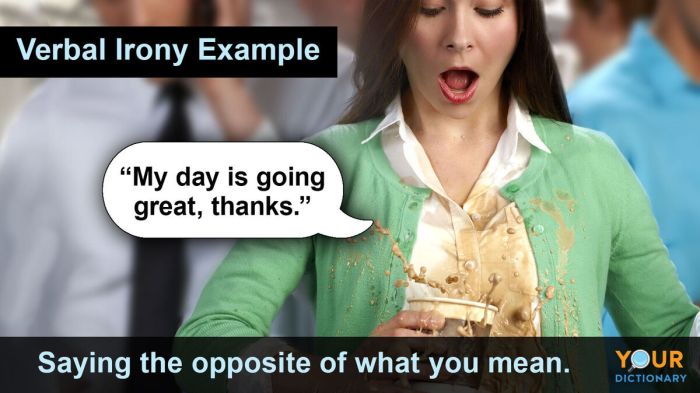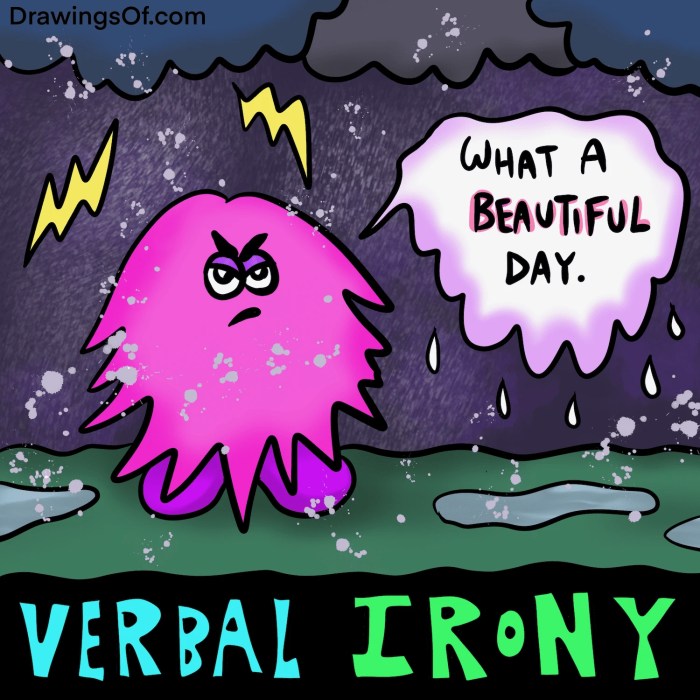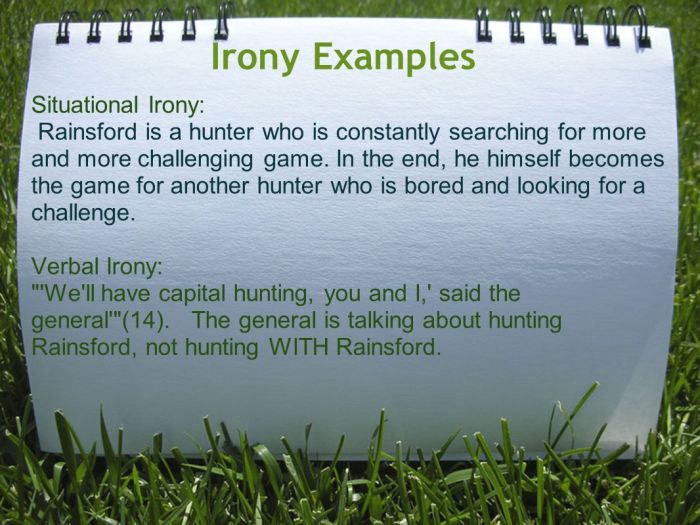Verbal irony in the most dangerous game – Verbal irony in “The Most Dangerous Game” takes center stage, beckoning readers into a world crafted with precision and wit. This literary device, employed with masterful skill, elevates the story to a realm of captivating complexity, inviting us to delve into its depths and unravel its hidden meanings.
As we embark on this literary journey, we will explore the multifaceted nature of verbal irony, examining its role in shaping the plot, developing the characters, and creating a suspenseful and thought-provoking atmosphere.
Verbal Irony in “The Most Dangerous Game”: Verbal Irony In The Most Dangerous Game

Verbal irony is a figure of speech in which the intended meaning of a statement is the opposite of its literal meaning. It is often used to create humor, sarcasm, or to emphasize a point.
In the short story “The Most Dangerous Game” by Richard Connell, verbal irony is used extensively to create a sense of suspense and to develop the characters.
Examples of Verbal Irony in the Story
- When Rainsford tells General Zaroff that he is a hunter, Zaroff replies, “I am a hunter, too.” This is ironic because Zaroff is not a hunter in the traditional sense; he hunts humans for sport.
- When Rainsford asks Zaroff why he hunts humans, Zaroff replies, “Because it is the most dangerous game.” This is ironic because hunting humans is not a game in the traditional sense; it is a deadly and cruel activity.
- When Rainsford finally escapes from Zaroff’s island, he tells the captain of the yacht that he has been “hunting.” This is ironic because Rainsford has been the hunted, not the hunter.
Characterization through Verbal Irony
Verbal irony is also used to develop the characters in “The Most Dangerous Game.” Rainsford is a skilled hunter who is initially confident in his abilities. However, as the story progresses, he begins to realize that he is no match for Zaroff.
This is evident in the way that Rainsford uses verbal irony to deflect his fear and insecurity.
Zaroff, on the other hand, is a cold and calculating killer who takes pleasure in hunting humans. He uses verbal irony to taunt and belittle Rainsford, which further highlights his cruelty and sadism.
Dramatic Irony and Suspense, Verbal irony in the most dangerous game
In addition to verbal irony, “The Most Dangerous Game” also uses dramatic irony to create suspense. Dramatic irony occurs when the reader knows something that the characters do not. This creates a sense of anticipation and dread, as the reader waits for the characters to discover the truth.
For example, the reader knows from the beginning of the story that Zaroff is hunting Rainsford. However, Rainsford does not realize this until the end of the story. This creates a sense of suspense, as the reader waits to see how Rainsford will escape from Zaroff’s island.
Essential FAQs
What is the significance of verbal irony in “The Most Dangerous Game”?
Verbal irony serves as a powerful tool in the story, highlighting the disparity between what is said and what is meant. It enhances the suspense, reveals the characters’ inner conflicts, and underscores the story’s themes of morality and the dangers of unchecked power.
How does verbal irony contribute to the development of the characters?
Verbal irony is a key element in塑造 the characters of Sanger Rainsford and General Zaroff. Rainsford’s initial belief in the sanctity of human life is juxtaposed with his later actions, while Zaroff’s twisted sense of honor and sportsmanship is revealed through his ironic remarks.
What is the relationship between verbal irony and dramatic irony in the story?
Verbal irony and dramatic irony work together to create a heightened sense of suspense. The reader is aware of information that the characters are not, leading to a growing sense of unease and anticipation.


